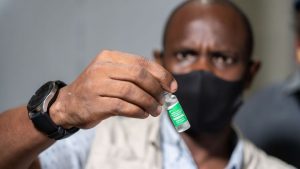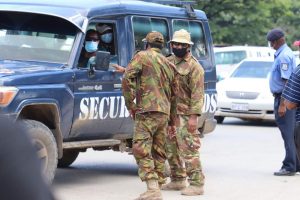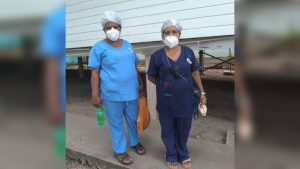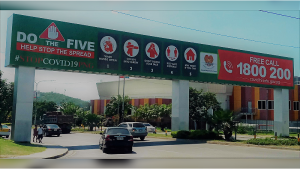More than 3,000 people in the National Capital District have been vaccinated from the 8,000 doses of the AstraZeneca vaccine that was donated by the Australian Government for frontline workers involved in PNG’s COVID-19 pandemic response, says Police Commissioner David Manning.
Mr Manning, who is Controller of the PNG COVID-19 National Pandemic Response, said health and essential workers including Police, Correctional Services and Defence personnel were among those who have been vaccinated thus far.
“I took the shot together with the Prime Minister Hon. James Marape, the Health Minister Hon. Jelta Wong and other national leaders. We are leading the fight against the COVID-19 pandemic and so as responsible leaders we took the AstraZenega vaccine. There have been no major side effects reported from us or the 3,000 other recipients of the vaccine so far.

“It is a choice each individual has to make but I urge everyone, especially the frontliners to be vaccinated. We are in the front leading the assault against COVID-19 and I need to know that all our fighters are properly protected against the virus which has so far claimed the lives of over three million people and infected close to 150 million people globally,” Mr Manning said.
Vaccine roll-out plan
The Controller said that the National Roll-out Plan for the COVID-19 vaccine began on March 25-26 with a training on COVID-19 vaccination for all Provincial Emergency Operation Centres (PEOCs). He said this was followed by a series of training activities/workshops for various target groups covering overview of the vaccination program and microplanning, vaccine, immunization safety, communication and demand generation.
Mr Manning said all these different training programs are still underway with the actual vaccination scheduled for Monday May 5.
He said all provinces are being sent their allocated doses of the AstraZenega vaccine. According to the distribution plan for the vaccine, 103,725 people have been listed to be vaccinated in the first phase. They are either health care workers, support staff of both public and private health facilities, workers at quarantine and isolation facilities, students at health institutions such as nursing colleges and medical schools, prison guards, border and immigration/custom officers, seaport workers, airport/aviation officers, airline workers, police, Defence Force personnel and teachers.

Vaccine distribution
“Under the COVAX program we have so far delivered vaccines to two provinces, Western Highlands and Hela. Both have received 3,100 doses each of the AstraZenega vaccine. Hela’s vaccine was delivered on Tuesday by a team from Port Moresby,” Mr Manning said.
The team consisted of Ms Martha Pogo, the Acting Manager of the Expanded Program on Immunisation, National Department of Health, Mr Philip Posu, Cold Chain Officer with the NDOH, Mr Humphrey Lubwama, UNICEF and Chief Superintendent Dominic Kakas from the National Control Centre. The team also attended a workshop on vaccination organized by Dr James Kintwa, the Chief Executive Officer of the Hela Provincial Health Authority for health workers from Hela.
“If the reaction from the Health workers in the Hela Province is an indication, I am confident of a successful roll-out of our COVID-19 vaccination program into the provinces,” Mr Manning said.

Globally, as of 5.16pm, April 28, 2021, a total of 148,329,348 confirmed cases of COVID-19 was reported, including 3,128,962 deaths. A total of 983,410,283 vaccine doses have been administered world-wide as of Wednesday April 28.
New Indian Variant
Mr Manning said a new variant, which has a so-called double mutation was detected in India. He said this is a worry to the experts who say it could be fueling India’s new wave, making it the world’s second worst-hit country, surpassing Brazil again, and is already overwhelming its hospitals and crematoriums. India has reported more than 14.5 billion COVID-19 cases so far and more than 175,600 deaths.
“For Papua New Guinea, the Genome sequencing of 457 samples done at the MDU laboratory in Australia has found no variant of COVID-19 in PNG. Although this is good news for us, we however, like many other countries, are worried about the Indian Variant spreading to our shores. We are watching closely and seriously considering taking measures to ensure this new variant and others like it do not enter PNG,” Mr Manning said.
The Controller said whilst the vaccine roll-out is set for May 5, all citizens must continue to observe the New Normal or “Niupela Pasin”.

Mr Manning said, “Even after vaccination we still have to adhere to the Niupela Pasin. The COVID-19 vaccine is no different to other vaccines against diseases such as tuberculosis (TB) which we all got when we were children. Many people still get TB even though they were vaccinated as children.
“So, it is important that people continue to follow the health measures in place against COVID-19, including wearing face masks, frequent hand washing with soap and water, physical distancing, avoiding crowds and maintaining general cleanliness.
“There are new variants of COVID-19 emerging in many countries, including India that is causing so much strife but by adhering to the health measures against COVID-19 or Niupela Pasin, you will help prevent the spread of COVID-19 and the new variants from entering into and spreading throughout the country.”

